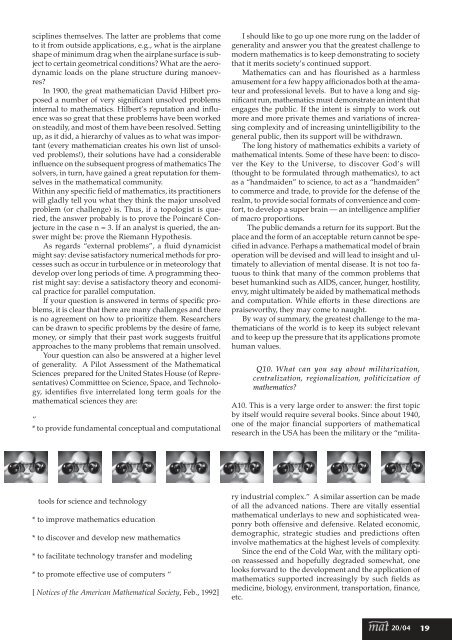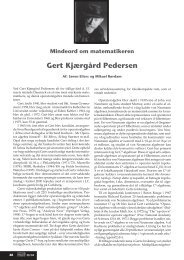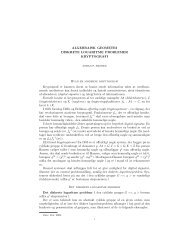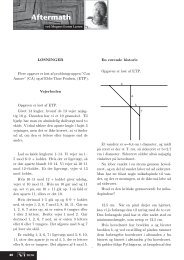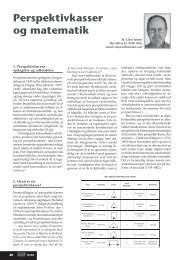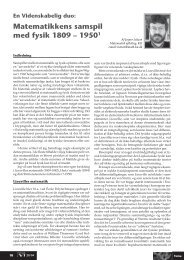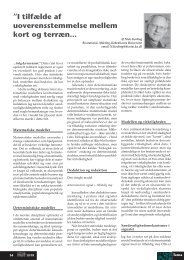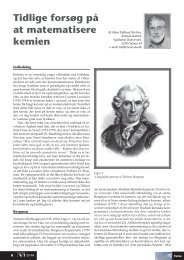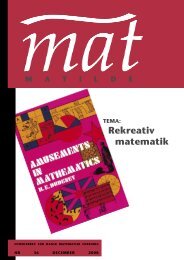MAT 15 - Matilde - Dansk Matematisk Forening
MAT 15 - Matilde - Dansk Matematisk Forening
MAT 15 - Matilde - Dansk Matematisk Forening
You also want an ePaper? Increase the reach of your titles
YUMPU automatically turns print PDFs into web optimized ePapers that Google loves.
sciplines themselves. The latter are problems that come<br />
to it from outside applications, e.g., what is the airplane<br />
shape of minimum drag when the airplane surface is subject<br />
to certain geometrical conditions? What are the aerodynamic<br />
loads on the plane structure during manoevres?<br />
In 1900, the great mathematician David Hilbert proposed<br />
a number of very significant unsolved problems<br />
internal to mathematics. Hilbert’s reputation and influence<br />
was so great that these problems have been worked<br />
on steadily, and most of them have been resolved. Setting<br />
up, as it did, a hierarchy of values as to what was important<br />
(every mathematician creates his own list of unsolved<br />
problems!), their solutions have had a considerable<br />
influence on the subsequent progress of mathematics The<br />
solvers, in turn, have gained a great reputation for themselves<br />
in the mathematical community.<br />
Within any specific field of mathematics, its practitioners<br />
will gladly tell you what they think the major unsolved<br />
problem (or challenge) is. Thus, if a topologist is queried,<br />
the answer probably is to prove the Poincaré Conjecture<br />
in the case n = 3. If an analyst is queried, the answer<br />
might be: prove the Riemann Hypothesis.<br />
As regards “external problems”, a fluid dynamicist<br />
might say: devise satisfactory numerical methods for processes<br />
such as occur in turbulence or in meteorology that<br />
develop over long periods of time. A programming theorist<br />
might say: devise a satisfactory theory and economical<br />
practice for parallel computation.<br />
If your question is answered in terms of specific problems,<br />
it is clear that there are many challenges and there<br />
is no agreement on how to prioritize them. Researchers<br />
can be drawn to specific problems by the desire of fame,<br />
money, or simply that their past work suggests fruitful<br />
approaches to the many problems that remain unsolved.<br />
Your question can also be answered at a higher level<br />
of generality. A Pilot Assessment of the Mathematical<br />
Sciences prepared for the United States House (of Representatives)<br />
Committtee on Science, Space, and Technology,<br />
identifies five interrelated long term goals for the<br />
mathematical sciences they are:<br />
“<br />
* to provide fundamental conceptual and computational<br />
tools for science and technology<br />
* to improve mathematics education<br />
* to discover and develop new mathematics<br />
* to facilitate technology transfer and modeling<br />
* to promote effective use of computers “<br />
[ Notices of the American Mathematical Society, Feb., 1992]<br />
I should like to go up one more rung on the ladder of<br />
generality and answer you that the greatest challenge to<br />
modern mathematics is to keep demonstrating to society<br />
that it merits society’s continued support.<br />
Mathematics can and has flourished as a harmless<br />
amusement for a few happy afficionados both at the amateur<br />
and professional levels. But to have a long and significant<br />
run, mathematics must demonstrate an intent that<br />
engages the public. If the intent is simply to work out<br />
more and more private themes and variations of increasing<br />
complexity and of increasing unintelligibility to the<br />
general public, then its support will be withdrawn.<br />
The long history of mathematics exhibits a variety of<br />
mathematical intents. Some of these have been: to discover<br />
the Key to the Universe, to discover God’s will<br />
(thought to be formulated through mathematics), to act<br />
as a “handmaiden” to science, to act as a “handmaiden”<br />
to commerce and trade, to provide for the defense of the<br />
realm, to provide social formats of convenience and comfort,<br />
to develop a super brain — an intelligence amplifier<br />
of macro proportions.<br />
The public demands a return for its support. But the<br />
place and the form of an acceptable return cannot be specified<br />
in advance. Perhaps a mathematical model of brain<br />
operation will be devised and will lead to insight and ultimately<br />
to alleviation of mental disease. It is not too fatuous<br />
to think that many of the common problems that<br />
beset humankind such as AIDS, cancer, hunger, hostility,<br />
envy, might ultimately be aided by mathematical methods<br />
and computation. While efforts in these directions are<br />
praiseworthy, they may come to naught.<br />
By way of summary, the greatest challenge to the mathematicians<br />
of the world is to keep its subject relevant<br />
and to keep up the pressure that its applications promote<br />
human values.<br />
Q10. What can you say about militarization,<br />
centralization, regionalization, politicization of<br />
mathematics?<br />
A10. This is a very large order to answer: the first topic<br />
by itself would require several books. Since about 1940,<br />
one of the major financial supporters of mathematical<br />
research in the USA has been the military or the “milita-<br />
ry industrial complex.” A similar assertion can be made<br />
of all the advanced nations. There are vitally essential<br />
mathematical underlays to new and sophisticated weaponry<br />
both offensive and defensive. Related economic,<br />
demographic, strategic studies and predictions often<br />
involve mathematics at the highest levels of complexity.<br />
Since the end of the Cold War, with the military option<br />
reassessed and hopefully degraded somewhat, one<br />
looks forward to the development and the application of<br />
mathematics supported increasingly by such fields as<br />
medicine, biology, environment, transportation, finance,<br />
etc.<br />
20/04<br />
19


